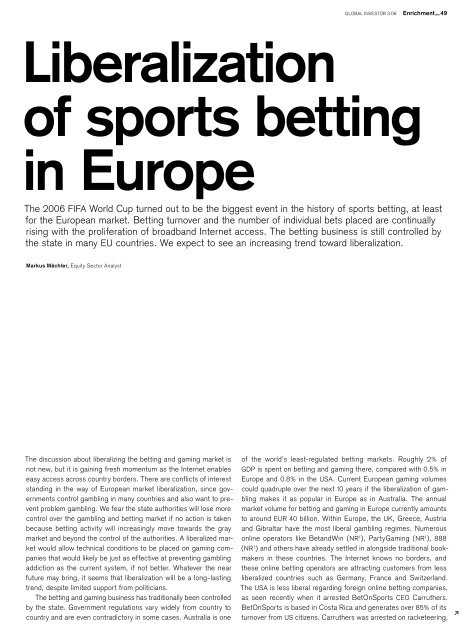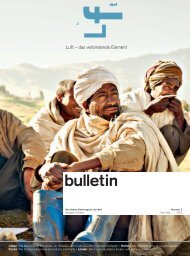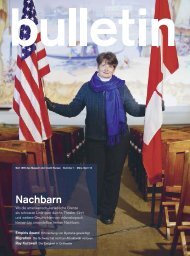Banking for 7 billion and 7 million
New challenges and opportunities of globalization Global Investor, 03/2006 Credit Suisse
New challenges and opportunities of globalization
Global Investor, 03/2006
Credit Suisse
You also want an ePaper? Increase the reach of your titles
YUMPU automatically turns print PDFs into web optimized ePapers that Google loves.
GLOBAL INVESTOR 3.06 Enrichment — 49<br />
Liberalization<br />
of sports betting<br />
in Europe<br />
The 2006 FIFA World Cup turned out to be the biggest event in the history of sports betting, at least<br />
<strong>for</strong> the European market. Betting turnover <strong>and</strong> the number of individual bets placed are continually<br />
rising with the proliferation of broadb<strong>and</strong> Internet access. The betting business is still controlled by<br />
the state in many EU countries. We expect to see an increasing trend toward liberalization.<br />
Markus Mächler, Equity Sector Analyst<br />
The discussion about liberalizing the betting <strong>and</strong> gaming market is<br />
not new, but it is gaining fresh momentum as the Internet enables<br />
easy access across country borders. There are conflicts of interest<br />
st<strong>and</strong>ing in the way of European market liberalization, since governments<br />
control gambling in many countries <strong>and</strong> also want to prevent<br />
problem gambling. We fear the state authorities will lose more<br />
control over the gambling <strong>and</strong> betting market if no action is taken<br />
because betting activity will increasingly move towards the gray<br />
market <strong>and</strong> beyond the control of the authorities. A liberalized market<br />
would allow technical conditions to be placed on gaming companies<br />
that would likely be just as effective at preventing gambling<br />
addiction as the current system, if not better. Whatever the near<br />
future may bring, it seems that liberalization will be a long-lasting<br />
trend, despite limited support from politicians.<br />
The betting <strong>and</strong> gaming business has traditionally been controlled<br />
by the state. Government regulations vary widely from country to<br />
country <strong>and</strong> are even contradictory in some cases. Australia is one<br />
of the world’s least-regulated betting markets. Roughly 2% of<br />
GDP is spent on betting <strong>and</strong> gaming there, compared with 0.5% in<br />
Europe <strong>and</strong> 0.8% in the USA. Current European gaming volumes<br />
could quadruple over the next 10 years if the liberalization of gambling<br />
makes it as popular in Europe as in Australia. The annual<br />
market volume <strong>for</strong> betting <strong>and</strong> gaming in Europe currently amounts<br />
to around EUR 40 <strong>billion</strong>. Within Europe, the UK, Greece, Austria<br />
<strong>and</strong> Gibraltar have the most liberal gambling regimes. Numerous<br />
online operators like Bet<strong>and</strong>Win (NR 1 ), PartyGaming (NR 1 ), 888<br />
(NR 1 ) <strong>and</strong> others have already settled in alongside traditional bookmakers<br />
in these countries. The Internet knows no borders, <strong>and</strong><br />
these online betting operators are attracting customers from less<br />
liberalized countries such as Germany, France <strong>and</strong> Switzerl<strong>and</strong>.<br />
The USA is less liberal regarding <strong>for</strong>eign online betting companies,<br />
as seen recently when it arrested BetOnSports CEO Carruthers.<br />
BetOnSports is based in Costa Rica <strong>and</strong> generates over 85% of its<br />
turnover from US citizens. Carruthers was arrested on racketeering,

















